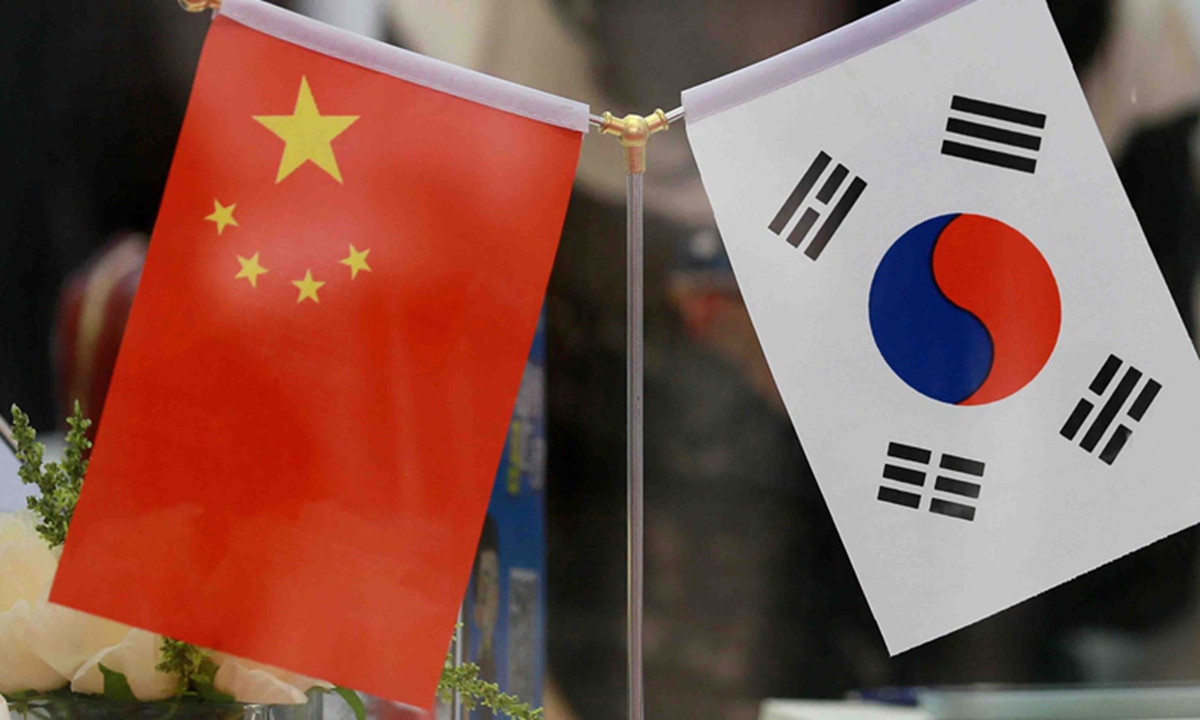New S.Korean ambassador inaugurated; experts say THAAD's threat to China's national security key obstacle to bilateral ties

China South Korea File photo:CGTN
South Korea's new ambassador to China, Chung Jae-ho, emphasized mutual respect as the key principle in diplomatic relations between Beijing and Seoul at his inauguration on Monday. Chinese experts said that for bilateral relations to improve, South Korea must be consistent in its policies, and avoid actions that threaten its neighbor's security.
Wang Min, deputy head of the Chinese Foreign Ministry's Protocol Department, received a copy of the Letter of Credence presented by Chung on Monday, according to the website of Chinese Foreign Ministry.
During his inauguration ceremony at the embassy on Monday, Chung said that the Yoon Suk-yeol administration considers mutual respect to be very important in advancing bilateral ties, particularly as it applies to national security, South Korean media KBS reported.
Chung pointed out that the biggest obstacle in bilateral relations are the growing negative opinions harbored by the two peoples, and if this problem is not reined in, bilateral ties won't be guaranteed, according to Yonhap News Agency.
"The negative public opinion between the two peoples has been lurking there for years, and has sometimes emerged due to certain issues, such as previous disputes surrounding paocai, known as kimchi in South Korea," Lü Chao, an expert on Korean Peninsula issues at the Liaoning Academy of Social Sciences told the Global Times, noting that the real issue to be solved in bilateral relations should be South Korean actions that threaten China's national security, especially the THAAD issue.
"A commitment made should be a commitment kept despite a change in government," said Chinese Foreign Ministry spokesperson Zhao Lijian on July 27, urging South Korea to act prudently on major issues concerning the security of its neighbors, after the South Korean foreign ministry claimed that the preceding Moon Jae-in government's "Three No's" policy on the THAAD issue is not a commitment to China.
No matter which party takes office, and no matter what political needs it has domestically, Seoul should ensure basic continuity and stability in its foreign policy, Zhao said at a regular press conference on Wednesday, stressing that this is the proper way to deal with relations with neighbors.
For China, THAAD is a real threat to national security, and South Korea's possible boosting of THAAD will definitely prompt countermeasures from China, according to Lü, who said that it will deal a direct blow to bilateral relations.
Yoon has been flirting with the idea of boosting THAAD even after taking office, and has been leaning closer to the US on certain issues. Lü said that Seoul is now facing an ordeal on the diplomatic front, especially on how to balance its position between China and the US.
Chung, meanwhile, vowed to do his best to find a solution that benefits the shared interests of the two nations, acknowledging that bilateral relations have been plagued by a lack of mutual understanding. He also pledged to do his best to maintain stable communication between South Korea and China.
Chinese experts also believed it is important to keep positive ties between the two countries, as they have already became important cooperation partners after three decades of developing ties.
Bilateral relations surely face a more complicated situation, said experts, noting that the two countries need to overcome new problems such as a lack of flexibility in competition between major countries, adjustment of diplomatic priorities and other issues.


